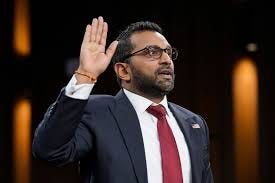Kash Patel Distances Himself from Trump’s Jan. 6 Pardons at FBI Director Confirmation Hearing
Patel also played down his involvement with the “J6 Choir” as senators scrutinized his past statements.
WASHINGTON — Kash Patel, nominated by President Donald Trump for a 10-year term as FBI Director, distanced himself from Trump’s controversial pardons of January 6 rioters during his confirmation hearing on Thursday. Patel told the Senate Judiciary Committee that he did not believe violent rioters who assaulted law enforcement officers deserved pardons.
“I have always rejected any violence against law enforcement, and I specifically reject any violence committed against law enforcement on January 6,” Patel stated at the hearing. “I do not agree with the commutation of any sentence for individuals who committed violence against law enforcement.”
Patel’s comments drew attention to the division within the Republican Party and even within Trump’s administration regarding the pardons issued for nearly all of the January 6 rioters. This sweeping action included pardons for individuals who assaulted police officers and carried weapons such as firearms, stun guns, and bear spray.
Senator Thom Tillis, R-N.C., also expressed his disagreement with Trump’s pardons during the hearing, stating that he had voiced similar sentiments to Capitol Police officers. “I’ve been thanking these Capitol Police officers, and I told them I thought the pardons of people who did harm to police officers sucked,” Tillis said. “I respectfully disagree with the president or whoever likely gave him advice.”
Before the pardons were granted on Inauguration Day, Vice President JD Vance and attorney general nominee Pam Bondi both publicly condemned violence against officers and opposed pardoning those involved in violent acts on January 6.
During the hearing, Patel was also questioned about his involvement with the "J6 Choir," a group formed to promote a song sung by individuals associated with the Capitol riot. Patel declined to turn toward Capitol Police officers in the hearing room when asked about his efforts to support the group. He clarified that he had worked to raise money for families of nonviolent January 6 defendants but reaffirmed his rejection of any violence against law enforcement.
Patel was hesitant to address the outcome of the 2020 election directly. When asked by Senator Mazie Hirono, D-Hawaii, if he believed that Joe Biden was the legitimately elected president, Patel acknowledged Biden's presidency without confirming or denying the legitimacy of the election. Hirono expressed concern, noting that the FBI's role in investigating election-related crimes makes it crucial for its director to clearly separate fact from conspiracy theories.
As Trump’s administration seeks to reshape the Justice Department and FBI, Patel's hearing comes amidst broader efforts to address ongoing investigations into Trump and his allies. While some FBI leaders have been demoted or encouraged to resign, Patel’s confirmation remains central to the administration’s vision for future leadership at the bureau.
Matthew Graves, the former U.S. attorney who oversaw the January 6 investigation, expressed concern over the impact of Trump’s pardons on accountability for rioters. Graves noted that hundreds of cases, some involving assaults on law enforcement, remain unresolved following the shutdown of the Capitol riot probe.
U.S. District Judge Paul L. Friedman recently criticized the claims made in Trump’s pardon proclamation, calling them “factually incorrect” and underscoring the strong legal case against January 6 rioters. He emphasized that the extensive documentation from law enforcement and prosecutors provides a clear and accurate record of the events of that day.
“There has been no ‘grave national injustice,’” Judge Friedman wrote, rejecting Trump’s assertions. “The voluminous records created in these cases... will forever reflect that this Court was at all times a place of law and fact.”


